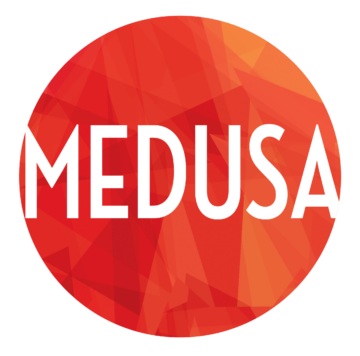
Medusa
2024 Festival
Director
Arpita Mukherjee
Music Director
Anessa Marie Scolpini
Cast
Jane Bruce, Adante Carter, Manik Umesh Choksi, Amy Jo Jackson, Taylor Iman Jones, Alex Lugo, Constantine Maroulis and Maria Wirries
Directing Assistant
JuJu Jaworski
For More Information Contact
itsparisamusic@gmail.com
Number of Acts: 2
Number of Principals (Male): 3
Number of Principals (Female): 7
Number of Principals (Trans / GNC): 1
Preferred Ensemble Size: 4
Total Cast Size: 15
Orchestra Breakdown:
Onstage preferable – Guitar, Mandola/Banjo, Upright Bass, Perc, Fiddle, Cello, Melodeon/Harp, Flute
Casting Notes:
The orchestra will be an actor-muso band who I envisage being onstage for the entirety piece and contributing to the action physically and vocally. The 4 ensemble members will integrate with the band throughout, as both singers and dancers, and together, they will provide a Greek Chorus of sorts, supporting and commenting on the action as it happens.
Genre & Style:
Folk
Synopsis
When you hear the name Medusa, what is the first thought that springs to mind? Mortal or Monster? Victim or Villain? Beguiler or Betrayed? This folk inspired, musical retelling of the ancient Greek myth, reclaims the narrative and gives Medusa the space to be the heroine of her own story.
Development History
The idea for Medusa was conceived in March 2023 while Parisa Shahmir was on tour with Fisherman’s Friends (UK) and, with the help of her London collaborators, she has been developing a concept album for the piece which continues to grow and shift as the show itself develops. Upon receiving funding from Help Musicians UK in February 2024, Parisa self-produced a showcase performance of Medusa to an industry audience in London.
Festival Successes
Artist Spotlight @ 2025 BEAM Showcase.
Fest Fast Facts
- Where it started. I began writing Medusa whilst on tour with Fisherman’s Friends The Musical in March 2023 (UK) and had completed a rough first draft of the piece by August 2023. Since then, I have created a concept album for the piece with my UK collaborators: Matt Isaac (orchestrator) and Dan Samson (sound designer) and after receiving a grant from Help Musicians UK in February 2024, I self-produced a small industry showcase for the musical in London in April. By the time it’s performed in the festival at NAMT, Medusa will have been fully conceived just over 1 year ago.
- When women are the storytellers, the human story changes. As an actress in the musical theatre industry myself, I found it frustrating how many musicals centered around female characters but were written by those who don’t have a real life understanding of the female experience. Stories about women, by women is something I am incredibly passionate about exploring as a writer and I hope by doing this, through Medusa and beyond, those who do identify as female feel inspired to speak their truth, rewrite old narratives and reclaim their stories.
- History isn’t what happened, it’s who’s telling the story. Medusa was initially inspired by Cassandra Speaks; a book by Elizabeth Lesser which examines the depiction of women in ancient history, mythology and biblical stories. I felt inspired to create a piece that explores the complexity of stories, who is telling them and through which perspective they are being told. With this musical, I intend to challenge the classic patriarchal portrayal of Medusa as “villain” and “monster” and instead, explore the experience of the real woman behind these labels.
- Folk music meets folklore. I’ve had an affinity for folk music since I was a child and I was excited to explore these kinds of sounds within Medusa, using instruments such as fiddles, mandolas, banjos, shruti boxes and harps which lend themselves so beautifully to this mystical world of folklore where our story takes place. The language of the piece very much a musical one, which is why Medusa is almost completely sung through. Musically I’ve worked to strike the perfect balance between an artistically impactful story that is also incredibly commercially viable. Combining honest, hooky songwriting with folk instrumentation is something I believe gives the piece a unique edge as it pulls together a few different genres to create memorable and meaningful music. My Iranian heritage on my father’s side has also influenced the music significantly allowing a subtle Middle Eastern flair to seep into areas of the melodic writing; another unique sound which isn’t too often explored on theatrical stages.
- A celebration of generations, ethnicities and gender identities. On generations: I envisage the 3 grandmothers, the Graeae, played by actors who are female identifying and 50/60+. I’ve noticed that when women reach a certain age in the industry, there are limited roles available to them which are interesting, nuanced and don’t pander to particular tropes or stereotypes. I aim to address that within Medusa and celebrate the experience, wit and knowledge that these characters will have to offer. They will form the political backbone of the piece. On gender: The character of Hermes is one I’ve felt compelled to explore as non-binary/gender fluid since I began writing. As a character that tows a fine line between sides, rejecting the binary of good and evil, right and wrong and essentially dances to the beat of their own drum, I think it would be a beautiful character to be explored in this way, especially given that the character and their motivations are not driven by gender, in a show that is otherwise widely gender driven. On ethnicity: Being Iranian myself, I have a very folky lilt to my voice with a subtle Middle Eastern influence in terms of ornamentation. This is something I was so excited to explore when writing Medusa; feeling like I could bring my own vocal stylings to the writing. I’m extremely passionate about working with actors from rich ethnic backgrounds and heritages, allowing them the space to explore their roots through the music and to, similarly, bring elements of their own musical language to the piece, rather than singing the words note for note as written on the page; something which I found incredibly liberating as a performer myself.
- Goals for the festival & beyond. Whilst Medusa is relatively ‘new’ in terms of creation, I pride myself, and my team in the UK, on our efficiency and momentum in creating and developing a piece of work and I believe the piece is now at the perfect stage to explore opportunities for a full scale workshop and/or development production. I’d love to create connections with theatres and producing partners across the US who are inspired by the story we are telling, the message behind it and who would be interested in working together to share this powerful story with audiences throughout the US and worldwide as soon as 2025-2026. I believe this piece has a wildly universal story that needs to be told more than ever in today’s society, and I am really excited to work with collaborators who share this vision and are passionate about making art that inspires, empowers and helps create meaningful change in the world.

